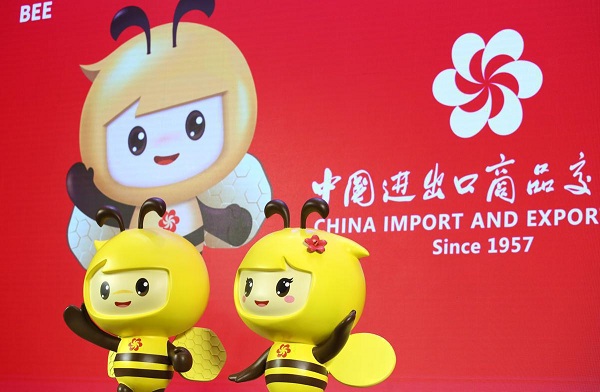China holds high the banner of free and fair trade

Hao Bao and Hao Ni are seen in Guangzhou, Guangdong province on Oct 9, 2021. [Photo by Zheng Erqi/chinadaily.com.cn]
The 130th Canton Fair, being held from Friday to Tuesday, is expected to boost global trade at a time when the global economic recovery has been foundering. Due to the uncertainties still surrounding the global economy, which has been compounded by the continuing COVID-19 epidemic, energy crisis and mounting inflation pressure, the International Monetary Fund has lowered its global growth forecast for 2021 by 0.1 percentage point from its 6.0 percent forecast in July.
Given these facts, China needs to keep promoting free trade and supporting economic globalization. To be sure, China has been committed to free trade for decades which can be seen in its policies and actions, the latest being its decision to open up its service sector.
China is the world's largest exporter of goods, with a huge trade surplus. Yet it has a huge trade deficit in services. In 2020, its surplus in goods trade was about $515 billion, but it also had a deficit of about $145.3 billion in service trade.
To reduce the service trade deficit, China announced a series of measures at the recent China International Fair for Trade in Services to further open up its economy, including the service sector, to the outside world. The ongoing Canton Fair and the 4th China International Import Expo to be held next month are likely to bring more good news for both domestic and international service providers.
China is the only country that features on the lists of all the categories of the UN's International Standard Industrial Classification, as well as the world's largest importer and exporter. In the first half of this year, China's exports and imports respectively accounted for 14.5 percent and 12 percent of the global total, up 0.9 and 0.8 percentage points year-on-year.
But while China has been holding aloft the flag of free and fair trade, the United States, as the old flag-bearer of free trade, has been shying away from its international responsibilities. There is no denying that the US was the initiator and leader of the international free trade system after World War II, and still exercises the greatest influence on the development and evolution of global trade rules.
Yet the US, instead of promoting free trade and reducing trade barriers for its trading partners, has dragged on the World Trade Organization's Doha Round of negotiations to fulfill its narrow goals, helped establish economic cliques aimed at preventing other major trading powers from enjoying the benefits of global trade, and intensified trade tensions with other economies, including China.
And in the nine months since being sworn in as US president, Joe Biden has more or less been following his predecessor's trade policy on China, disappointing the business community both in and outside the US.
The international community expects the US to help boost global trade. But since the US is unwilling to do so, China, as part of its international responsibility, has been playing that role and upholding the banner of free trade. However, China has become the target of trade protectionism while trying to boost global trade, so it also needs to take measures to safeguard its national and core interests.
As a country aware of the unfairness of the existing international economic and trade rules, China has been promoting the establishment of a more just and reasonable global economic order. China needs to carry the flag of free trade also because the US has been more frequently interfering in other countries' internal affairs.
China needs to continue playing this role in its own as well as the world's interests. China remains committed to free trade, wider opening-up, and further improving its business environment, so both domestic and foreign companies can reap the benefits of the country's huge market and sustainable economic development.
The author is a researcher at the Chinese Academy of International Trade and Economic Cooperation.
The views don't necessarily reflect those of China Daily.
If you have a specific expertise, or would like to share your thought about our stories, then send us your writings at opinion@chinadaily.com.cn, and comment@chinadaily.com.cn.
All rights reserved. Presented by China Daily

